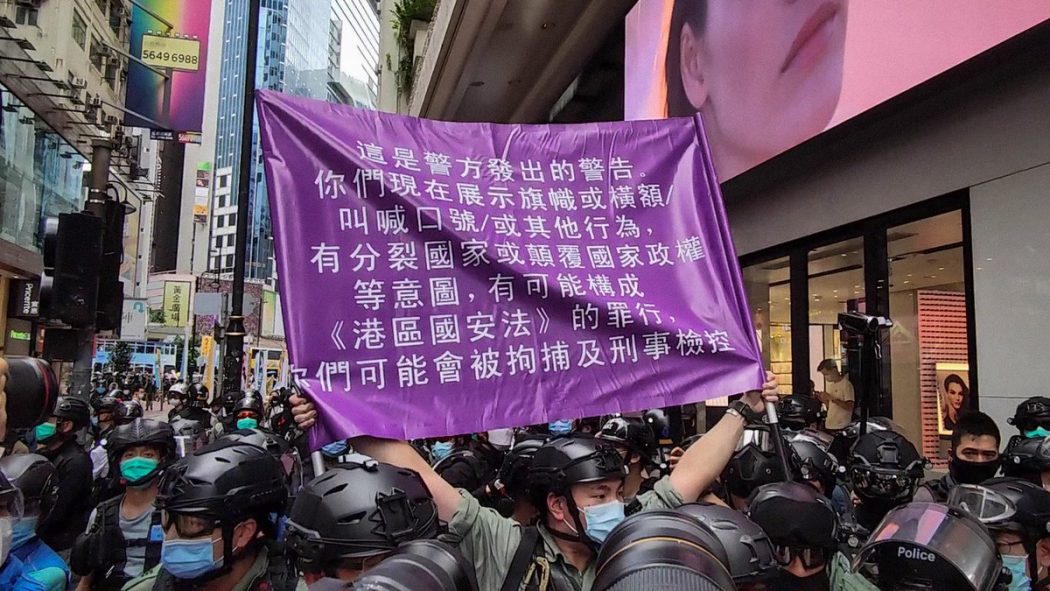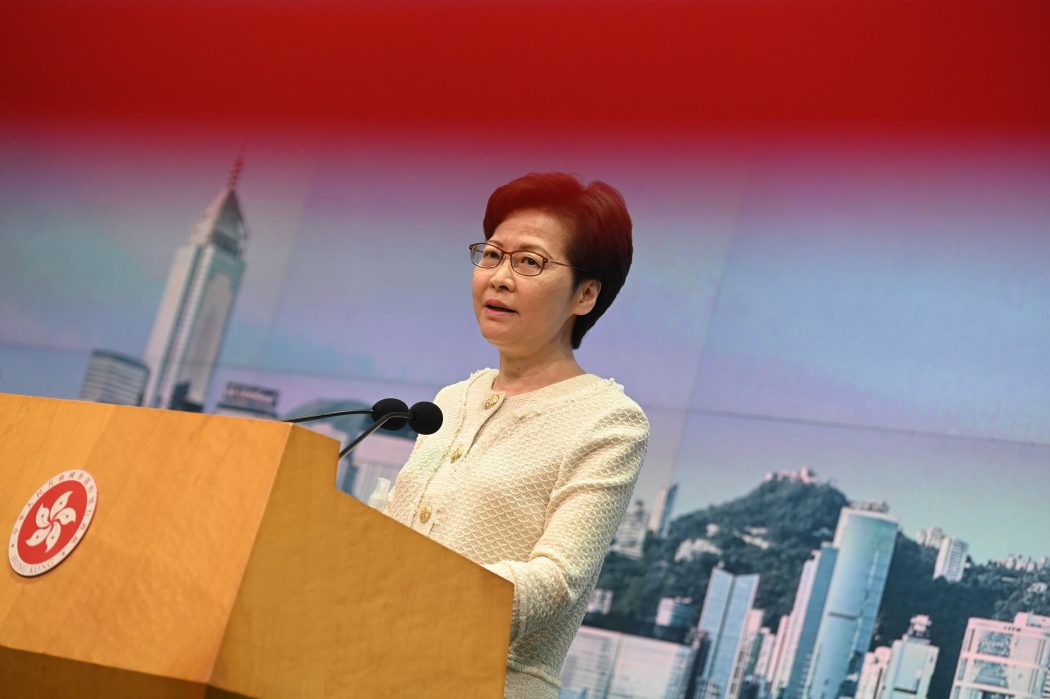Well, I think we were conned. We all thought we were watching a play called “One Country Two Systems”, but this now turns out to have been a mere Prologue, like the bit at the beginning of “Romeo and Juliet” where an actor orates before a closed curtain.
Now the curtain has opened and it is immediately apparent that there has been a change. Tonight’s entertainment will be “Welcome to Xinjiang-on-sea”.

The transition has been quite breathtaking. The bit which I overlooked in the initial announcement was the role of the National Security Committee (officially the Committee for Safeguarding National Security). This, it was said, would lay down the “rules” for the enforcement of the national security law.
You might think that this would involve policing the limits of that law, to ensure that the specialists, in their zeal for national security, did not stray into other areas. But that is not how the Chinese system works.
The National People’s Congress is often described as “China’s rubber-stamp parliament.” This is inaccurate. It has none of the attributes of a parliament and does none of the things which parliaments do. It does not debate, it does not scrutinise, it does not supervise the executive, it does not control public expenditure. Its meetings resemble the traditional annual ceremony in which Ming emperors used to placate the Gods to ensure a bountiful harvest, and have about as much practical significance.

Laws, instead, are made by government departments, leading Western translators who are used to a different system to call them “regulations”. There is no obligation on departments to limit themselves, or conform to, the occasional resounding declarations of principle which emerge from the NPC.
Our local national security committee is in the same happy position. It is answerable to nobody. It is not subject to judicial review, legislative scrutiny, or even the friendly attentions of the press. Its meetings are private, its deliberations secret.
The rules it issues – which the Standard is still hilariously calling “guidelines” – create new offences and ordain punishments for those committing them. In other words the committee is free to make whatever laws it likes, provided only that some verbal trickery can get them under the “national security” umbrella. As the committee has only to satisfy itself on this point, this is not a very exacting standard.

If you were consciously setting up a committee to replace Legco and Exco, I am not sure that this one would have passed muster. It is grossly overweight in the order branch, underweight in legal advice, and lighter than air in most of the matters which properly concern governments.
It is nominally presided over by our unloved Chief Executive (was there not a British prime minister known as Attila the Hen?) and in practice led by a mainland “adviser”, a bureaucrat who probably thinks a human right is a sort of organic neon tube.
Naked and vulnerable at the feet of this grim gathering lie all those rights which were supposedly guaranteed for 50 years. The committee is not bound by the Bill of Rights Ordinance, nor by the Basic Law. All the safeguards you thought you had, even fundamental things dating back to 1688, are now levelled.
We shall, I expect, see two tendencies. One is to downplay the role of Legco, which our leaders fear they will shortly lose control of. Mrs Attila, I beg your pardon Mrs Lam, commented the other day when defending a minor evasion of legislative scrutiny that you “can’t do anything with Legco” these days.

Well of course what you can do with an elected assembly depends on particular skills, like consultation, persuasion and compromise, which allow you to bring together people with different viewpoints. If your approach to opposition is to crush it, then consensus will be elusive.
The other thing we can expect to happen is the extension of national security to areas with which it has nothing to do.
First specimen: the primary election. Holding a primary election is not mentioned in Hong Kong’s election law. In fact, it is rarely mentioned in election laws elsewhere. How parties or groups choose their candidates for election is up to them. They may in other countries consult rich donors, party members, likely voters, or the entire population.
Holding a primary in which anyone can vote is unusual but not unprecedented. Some US states have what they call “open primaries” which work this way. Nobody’s rights are infringed, nothing about the fairness or openness of the election is affected in any way. Losers, if they insist, can run for election without the endorsement of the party which ran the primary.

To drag this issue into the national security area you have to first say that the objective of the primary is to secure a majority of the seats in Legco. This can hardly be illegal in itself because the Liaison Office has been doing the same thing in the government’s interest for years.
But wait, having achieved a majority, the winning party will then seek to force the government to give way on at least some of the “five demands” by refusing to cooperate on other matters. This, in the Hong Kong and Macau Affairs Office view, would amount to a “colour revolution”.
You would think the members of a party which shot its way to power would be more careful in using the word “revolution”. Actually, what the primary people are proposing is the use of a procedure provided in the Basic Law.

Oddly enough I suspect I had something to do with this. My career briefly intersected with the drafting of the Basic Law when I was asked to edit one of the early proposals. I sent it back with a polite memo pointing out what I thought was a flaw.
The idea then was that if Legco members were dissatisfied with the Chief Executive (a long shot in those days, but something they thought should be catered for), they could pass a motion of no confidence, and the CE would have to resign. In order to make this difficult, it was suggested that the motion should require a super majority, I think it was of two-thirds.
My criticism was that a motion of no confidence was not a test of the legislature’s love for the government, it was a test of whether the government could still pass the bills it needed to keep going. New laws could be dispensed with, but a constant stream of legislative approval was required for the raising and spending of money.
If a CE was saved by the lack of a super majority, he or she might finish up with almost 60 per cent of members still opposed to the government who would not vote for funding.

I heard nothing in reply to my memo but when the Basic Law emerged the vote of confidence had been replaced by the present arrangement, under which if Legco refuses to pass a funding bill, the CE has to call a fresh election. If the new Legco is similarly recalcitrant, then the CE must resign and be replaced.
This is a constitutional procedure, not a revolution, and indeed it appears that if a candidate believes he or she will wish to use it, then honesty requires that the electorate should be informed of this before the election.
However what I think of this arrangement and what you think of it are besides the point. What matters is what the National Security Committee thinks of it. Maybe they will decide to disqualify everyone who participated in the primaries. There is nothing to stop them.
Do not, at least, look for help from the Electoral Affairs people, who woke from hibernation this week to point out that it was a criminal offence to discourage someone from running for election. Considering their inglorious role in the DQ festival, it is difficult to think of a response to this which could be printed in a family newspaper.
